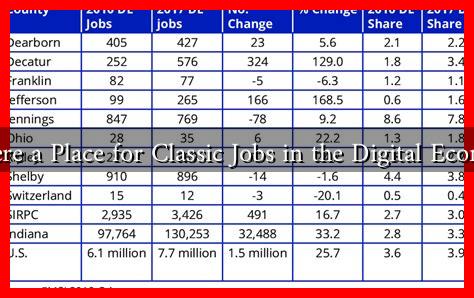-
Table of Contents
- Is There a Place for Classic Jobs in the Digital Economy?
- The Evolution of Work in the Digital Age
- Classic Jobs: Definition and Examples
- Adapting Classic Jobs to the Digital Economy
- Case Studies: Success Stories of Classic Jobs in the Digital Economy
- The Future of Classic Jobs in the Digital Economy
- Conclusion
Is There a Place for Classic Jobs in the Digital Economy?
The digital economy has transformed the way we work, communicate, and conduct business. With the rise of technology, many traditional jobs have been disrupted or rendered obsolete. However, the question remains: is there still a place for classic jobs in this rapidly evolving landscape? This article explores the relevance of traditional roles in the digital economy, examining how they adapt, coexist, and even thrive alongside modern innovations.
The Evolution of Work in the Digital Age
As technology advances, the nature of work has shifted dramatically. The digital economy encompasses a wide range of sectors, including e-commerce, digital marketing, and remote work. According to a report by the World Economic Forum, it is estimated that by 2025, 85 million jobs may be displaced by a shift in labor between humans and machines. However, this same report also predicts that 97 million new roles may emerge, many of which will require distinctly human skills.
Classic Jobs: Definition and Examples
Classic jobs refer to traditional roles that have been part of the workforce for decades, if not centuries. These include professions such as:
- Teachers
- Nurses
- Accountants
- Construction workers
- Retail workers
While some of these roles have been impacted by technology, they continue to play a vital role in society. For instance, teachers are now integrating digital tools into their classrooms, enhancing the learning experience while maintaining the core essence of education.
Adapting Classic Jobs to the Digital Economy
Many classic jobs are not disappearing; rather, they are evolving. Here are some ways traditional roles are adapting:
- Integration of Technology: Teachers are using online platforms for remote learning, while healthcare professionals are utilizing telemedicine to reach patients.
- Upskilling and Reskilling: Workers in classic jobs are increasingly seeking training in digital skills to remain competitive. For example, accountants are learning to use advanced software for data analysis.
- Hybrid Models: Many industries are adopting hybrid work models, allowing classic roles to incorporate flexibility and remote work options.
Case Studies: Success Stories of Classic Jobs in the Digital Economy
Several organizations have successfully integrated classic jobs into the digital economy, demonstrating their continued relevance:
- Education Sector: The Khan Academy has revolutionized education by providing free online resources while still valuing the role of teachers in guiding students through complex subjects.
- Healthcare: The Mayo Clinic has embraced telehealth services, allowing nurses and doctors to provide care remotely while maintaining the personal touch that is essential in healthcare.
- Retail: Companies like Walmart have combined traditional retail with e-commerce, allowing employees to manage online orders while still serving customers in-store.
The Future of Classic Jobs in the Digital Economy
As we look to the future, it is clear that classic jobs will continue to have a place in the digital economy. However, their success will depend on several factors:
- Embracing Change: Workers must be willing to adapt to new technologies and methodologies.
- Continuous Learning: Lifelong learning will be essential for professionals in classic jobs to stay relevant.
- Collaboration with Technology: Classic roles will need to find ways to work alongside technology rather than compete against it.
Conclusion
In conclusion, classic jobs are not only surviving in the digital economy; they are evolving and adapting to meet new challenges. While technology may change the way these roles are performed, the fundamental human skills they require remain invaluable. As we move forward, the integration of classic jobs with digital innovations will create a more dynamic and resilient workforce. Embracing this change will ensure that traditional roles continue to thrive in an increasingly digital world.
For further insights on the impact of technology on jobs, you can explore resources from the World Economic Forum.

